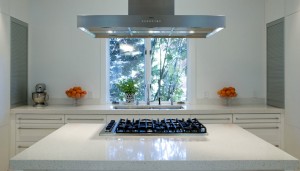Consider the limitations of a material, not just the look, when choosing a countertop.
 Whether you are building a new kitchen or refreshing your current one, your choice of countertop will make a huge impact in the look of the finished room. However, this doesn’t mean you should just choose the countertop that looks the most beautiful to you. You actually need to start with some more practical considerations regarding how your countertop will perform. This might take your favorite materials off the table, but in the long run you will be happier because you will not have to deal with the heartbreak of having your beautiful countertop ruined by daily life.
Whether you are building a new kitchen or refreshing your current one, your choice of countertop will make a huge impact in the look of the finished room. However, this doesn’t mean you should just choose the countertop that looks the most beautiful to you. You actually need to start with some more practical considerations regarding how your countertop will perform. This might take your favorite materials off the table, but in the long run you will be happier because you will not have to deal with the heartbreak of having your beautiful countertop ruined by daily life.
Are You Rough On Your Counters?
The first question to consider when choosing a kitchen countertop is how much you are actually going to use the countertop, and how rough this use is likely to be. If you seldom or never cook at home, chances are you’ll be able to keep any type of countertop pristine. But if you love to cook and you like to make a mess while doing it, you need to know that:
- Marble countertops can be scratched and may be etched or stained by exposure to water or acids from food and drink spills. Marble can also chip or crack as it is a softer stone.
- Granite is more resilient than marble but can still be scratched, etched, stained, or chipped if mistreated.
- Wood countertops are softer than stone and may be scratched or dented relatively easily.
- Concrete countertops can be discolored by wet items or etched by acidic spills
- Laminate can be scorched by hot pans
This is not to say that you cannot get a marble countertop if you love to cook. It just means you will have to be much more careful in how you treat your countertop. This brings us to the next question:
How Much Maintenance Are You Willing to Do?
While any type of countertop needs cleaning, almost every material except quartz and laminate requires significant maintenance in order to prevent the sorts of scratches and stains that are bound to happen if you cook in your kitchen. For instance:
- Marble countertops must be sealed periodically in order reduce the pore size of the stone and prevent water and liquids from penetrating and causing damage. With white or light-colored marble you may need to seal multiple times per year.
- Granite must also be sealed, though as a harder stone with tighter pores it does not need to be sealed as frequently as marble.
- Concrete countertops must not only be sealed but also waxed about four times per year.
- Wood countertops also need sealing upon installation. They must be oiled consistently—about once every few months—in order to remain protected against water damage.
Now Consider the Look
Once you understand the limitations and care requirements of different countertop materials, you are ready to make an informed decision about your kitchen design. Now is the time to consider what color, texture, and overall look you like for a countertop. You may find that quartz materials from brands like Caesarstone and Silestone can deliver much of the visual appeal of natural stone without the maintenance headaches.
Ready to Browse?
If you would like to see examples of possible countertop choices, come to Mission West Kitchen & Bath. We’ll be happy to show you the latest designer offerings.



Recent Comments